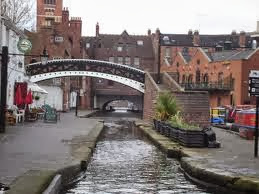‘Visitors complain that there’s no historic old town,’ I’m told one of his advisers complained to the Sultan of Dubai, during a conversation about how to stimulate tourism.
‘That’s OK,’ replied the Sultan. ‘We’ll build one.’
Dubai: haven of the synthetic.
Note the dust haze in the background
What prompted me to think of Dubai again was a friend’s photo from his hotel window there. It showed a glittering panorama of nighttime lights, conjuring up the liveliness that gives the place its charm.
For those who find it charming.
The story about the old town may be a myth. Many myths, though, contain a core of truth, and Dubai is the expression of everything that is artificial, synthesised, planned.
But like most state planning (one thinks of the Soviet Union), it’s not always well-planned. The city has a super-highway running through its centre. That’s like plunging a dagger through the heart of a community. It’s what makes Birmingham a sad place, despite the liveliness of the area around Broad Street and the Canal: try to walk almost anywhere and you have to get to the other side of a major road, and that means boxed-in underpasses, dank, sinister and usually smelling of urine.
Isn’t it odd that so many men only need a cover over a street to feel they can pee in it?
 |
| Birmingham: many charming sights but in a sadly vandalised city |
Indeed, at one point they were having to scoop out the ground to take the railway down below ground level.
Its attachment to high-speed roads means that Dubai has the same problem as Birmingham for walkers, but in spades. While we were out there to discuss a project, a colleague suggested that the two of us walk the few hundred metres between our hotel and another where we were to attend a working dinner. The idea was that we could talk over some of the issues ahead more easily than we could at a crowded table.
The walk took nearly forty minutes. Again and again, we were forced to backtrack, as we reached roads we couldn’t cross: no underpass, no traffic lights. Eventually, we found a way through, but it took us across a building site and we arrived with mud-caked shoes.
Dubai doesn’t do walking. The beaches are slightly unprepossessing, especially as Dubai is generally cloaked in a fine mist of dust blowing off the desert inland. But in any case it’s extremely difficult to reach the coast on foot, so the simple desire to go for a walk along the beach is beset by logistical obstacles so immense that they’re likely to be terminally off-putting to most normal people.
Dubai, though, appeals to the super-rich. They, after all, travel everywhere by vehicle: why would they want to walk from one hotel to another? As for beaches, they prefer ones that are privately owned, by them or their friends. And no mere physical beauty can make a place as attractive as a highly favourable tax regime, and from that point of view Dubai’s pretty much unbeatable.
In any case, that regime means that you’re saving so much money you can easily get away as often as you want to visit somewhere with better views – Switzerland, say, or the Caribbean, where fiscal advantages are marginally less attractive.
That’s presumably why the boats, or perhaps I should say small ships, in the marinas never seemed to move anywhere. They’re badges of wealth proudly displayed by absentee owners who feel little need to use them, and probably spend most of their time in more salubrious places.
To me, few places I’ve visited have seemed less salubrious than Dubai. Synthetic, soulless, a millionaires’ playground with none of the joy of the child’s variety. What marks it most is the reek of money; whether that’s a scent or a stench I leave it to you to decide, according to taste.
Herself much quoted, Dorothy Parker liked the words of Maurice Baring: ‘If you would know what the Lord God thinks of money, you have only to look at those to whom he gives it’. For me, Dubai is where the Lord has offered the same people their spiritual home.

2 comments:
And then there was this man from some Emirate who demanded an apology from Forbes' for suggesting he ONLY possessed $12 billion.
San
He should thank God no one gave an estimate of his worth.
Post a Comment